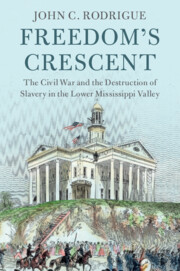Book contents
- Freedom’s Crescent
- Cambridge Studies on the American South
- Freedom’s Crescent
- Copyright page
- Dedication
- Epigraph
- Contents
- Figures
- Acknowledgments
- Abbreviations
- Additional material
- Introduction
- Prologue Life – and Labor – on the Mississippi
- Part I From War for Union to Military Emancipation, 1860–1862
- Part II From Military Emancipation to State Abolition, 1863
- Part III Abolition: State and Federal, 1864
- 10 “Slavery Is Incompatible with a Republican Form of Government”
- 11 Of Foul Combinations and the Common Object
- 12 “The Jewel of Liberty”
- 13 “The Virus of Slavery Is As Virulent As It Ever Was”
- 14 “No Longer Slaves but Freedmen”
- 15 “So Long As a Spark of Vitality Remains in the Institution of Slavery”
- 16 “Freedom, Full, Broad and Unconditional”
- 17 “To Resolve Never Again to Be Reduced to Slavery”
- Part IV The Destruction of Slavery, 1865
- Epilogue Memphis and New Orleans: May 1–3 and July 30, 1866
- Bibliography
- Index
17 - “To Resolve Never Again to Be Reduced to Slavery”
from Part III - Abolition: State and Federal, 1864
Published online by Cambridge University Press: 19 January 2023
- Freedom’s Crescent
- Cambridge Studies on the American South
- Freedom’s Crescent
- Copyright page
- Dedication
- Epigraph
- Contents
- Figures
- Acknowledgments
- Abbreviations
- Additional material
- Introduction
- Prologue Life – and Labor – on the Mississippi
- Part I From War for Union to Military Emancipation, 1860–1862
- Part II From Military Emancipation to State Abolition, 1863
- Part III Abolition: State and Federal, 1864
- 10 “Slavery Is Incompatible with a Republican Form of Government”
- 11 Of Foul Combinations and the Common Object
- 12 “The Jewel of Liberty”
- 13 “The Virus of Slavery Is As Virulent As It Ever Was”
- 14 “No Longer Slaves but Freedmen”
- 15 “So Long As a Spark of Vitality Remains in the Institution of Slavery”
- 16 “Freedom, Full, Broad and Unconditional”
- 17 “To Resolve Never Again to Be Reduced to Slavery”
- Part IV The Destruction of Slavery, 1865
- Epilogue Memphis and New Orleans: May 1–3 and July 30, 1866
- Bibliography
- Index
Summary
Wartime free labor under military auspices evolves in the Union-occupied lower Mississippi valley during the second half of 1864. Legislatures of Arkansas and Louisiana fail to address new labor arrangements, and plantation affairs remain under Federal military authority. Sugar planters, confronting the abolition of slavery in Louisiana, clamor for labor and racial control in planning for the 1865, whereas freedpeople and their advocates call for economic independence and criticize the Unionist government’s failure to implement racial equality. The cotton region witnesses continuing conflict over the new labor arrangements, with freedpeople pushing for alternatives to wage labor and access to land. The Davis Bend community underscores black aspirations for economic independence, while reports of the reenslavement of freedpeople along the Mississippi River illustrate the desperation of former slaveholders to preserve slavery.
- Type
- Chapter
- Information
- Freedom's CrescentThe Civil War and the Destruction of Slavery in the Lower Mississippi Valley, pp. 337 - 356Publisher: Cambridge University PressPrint publication year: 2023



